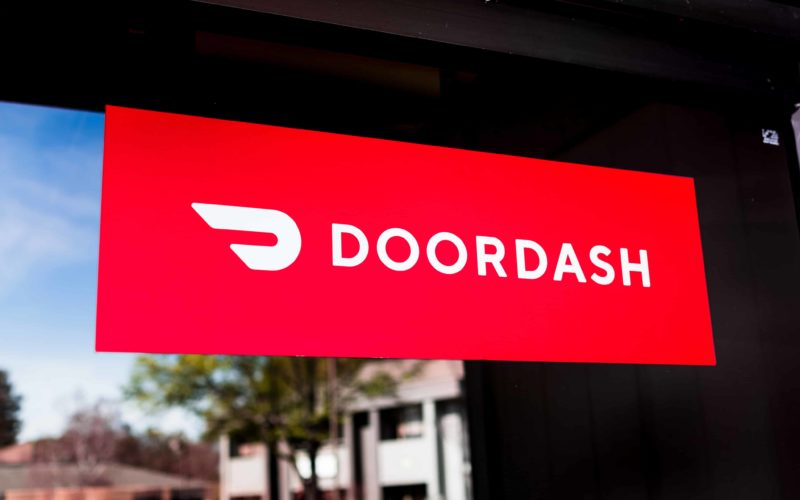Business
DoorDash Driver Delivers Side of Weed, Gets Canned

DoorDash does not tolerate the actions of the Dasher and promptly responded to the situation.
One DoorDash customer received more than he bargained for when he placed an order of food—finding an unwanted bag of weed in his order, and decided to complain about it. The actions of the driver led to his termination as a Dasher with the company.
A Columbus, Ohio man, who wishes to remain anonymous, said he ordered food through DoorDash on August 9 and complained that the bag of weed made him feel “scared.”
“I was scared at first but then again, I wasn’t very surprised,” the man who ordered food from DoorDash told ABC 6.
He provided a photo of his bag of food where he found a fork and a bag filled with cannabis. The photo shows a baggie adorned with alien heads holding what appears to be about a gram of weed. “Did this start with the driver?” he said. “Or did this start in the restaurant that I ordered this from?”
“It’s scary, because I’m a healthcare worker, and I see how this affects people every day,” the customer said. “I even have a close friend whose nephew actually passed away due to smoking some marijuana that was laced by fentanyl.” (Both WebMD and Snopes have dismissed claims of fentanyl-laced pot, and Dr. Peter Grinspoon told High Times that fentanyl most likely disintegrates with the heat of a flame.)
“What happened is not acceptable, and we have removed the Dasher from our platform,” a DoorDash representative told ABC6 and FOX28 in a statement. We appreciate the customer for reporting the incident.”
“I think about the kids,” he said. “I have a nephew. I think about my coworker. He has granddaughters and grandsons.”
DoorDash quickly responded and told the customer that the Dasher had been terminated. “We do not condone this type of action and have therefore taken the step in removing them from our platform,” the customer email from DoorDash reads. “This Dasher will no longer be able to deliver future orders on DoorDash.”
Dashers, or DoorDash delivery drivers, must submit both a DMV and criminal background check before becoming a driver according to the company’s background check policy.
DoorDash and Cannabis
Four years ago, at Fortune’s 2018 Brainstorm Tech conference, DoorDash CEO Tony Xu said that while the company toyed with the idea of cannabis delivery, there were no immediate plans of doing that, at least not in the United States.
“That’s our general counsel’s favorite question,” Xu said. “That’s not what we’re doing today nor what we plan on doing. There are a lot of complications around payment when it comes to something that has that level of regulation.”
Since then, however, the company explored the cannabis industry in Canada, where it’s legal at the federal level. Deliveries, however, are not yet part of the equation.
Forbes reported last April that Canadian cannabis retail outlet Superette led a partnership with DoorDash Inc., offering pick-up out of its Toronto, Canada, locations. The partnership is with DoorDash Technologies Canada, Inc., a subsidiary of DoorDash Inc. The rumor that DoorDash was getting involved in cannabis was first exposed on Twitter, Benzinga reported last April.
The partnership features curated menus and special collections to reflect the local area. Superette goods, however, are available for pick-up only and not yet offered for delivery.
Uber Eats also announced a partnership with a Canadian cannabis retailer, in this case, Tokyo Smoke.
Uber Technologies Inc. added Canadian cannabis retailer Tokyo Smoke to its marketplace on November 29, 2021—allowing customers to browse, then place orders from the Uber Eats app and finally pick it up at their nearest Tokyo Smoke store, with dozens of locations in the province. You can browse through an assortment of cannabis products.
Source: https://hightimes.com/news/doordash-driver-delivers-side-of-weed-gets-canned/
Business
New Mexico cannabis operator fined, loses license for alleged BioTrack fraud

New Mexico regulators fined a cannabis operator nearly $300,000 and revoked its license after the company allegedly created fake reports in the state’s traceability software.
The New Mexico Cannabis Control Division (CCD) accused marijuana manufacturer and retailer Golden Roots of 11 violations, according to Albuquerque Business First.
Golden Roots operates the The Cannabis Revolution Dispensary.
The majority of the violations are related to the Albuquerque company’s improper use of BioTrack, which has been New Mexico’s track-and-trace vendor since 2015.
The CCD alleges Golden Roots reported marijuana production only two months after it had received its vertically integrated license, according to Albuquerque Business First.
Because cannabis takes longer than two months to be cultivated, the CCD was suspicious of the report.
After inspecting the company’s premises, the CCD alleged Golden Roots reported cultivation, transportation and sales in BioTrack but wasn’t able to provide officers who inspected the site evidence that the operator was cultivating cannabis.
In April, the CCD revoked Golden Roots’ license and issued a $10,000 fine, according to the news outlet.
The company requested a hearing, which the regulator scheduled for Sept. 1.
At the hearing, the CCD testified that the company’s dried-cannabis weights in BioTrack were suspicious because they didn’t seem to accurately reflect how much weight marijuana loses as it dries.
Company employees also poorly accounted for why they were making adjustments in the system of up to 24 pounds of cannabis, making comments such as “bad” or “mistake” in the software, Albuquerque Business First reported.
Golden Roots was fined $298,972.05 – the amount regulators allege the company made selling products that weren’t properly accounted for in BioTrack.
The CCD has been cracking down on cannabis operators accused of selling products procured from out-of-state or not grown legally:
- Regulators alleged in August that Albuquerque dispensary Sawmill Sweet Leaf sold out-of-state products and didn’t have a license for extraction.
- Paradise Exotics Distro lost its license in July after regulators alleged the company sold products made in California.
Golden Roots was the first alleged rulebreaker in New Mexico to be asked to pay a large fine.
Source: https://mjbizdaily.com/new-mexico-cannabis-operator-fined-loses-license-for-alleged-biotrack-fraud/
Business
Marijuana companies suing US attorney general in federal prohibition challenge

Four marijuana companies, including a multistate operator, have filed a lawsuit against U.S. Attorney General Merrick Garland in which they allege the federal MJ prohibition under the Controlled Substances Act is no longer constitutional.
According to the complaint, filed Thursday in U.S. District Court in Massachusetts, retailer Canna Provisions, Treevit delivery service CEO Gyasi Sellers, cultivator Wiseacre Farm and MSO Verano Holdings Corp. are all harmed by “the federal government’s unconstitutional ban on cultivating, manufacturing, distributing, or possessing intrastate marijuana.”
Verano is headquartered in Chicago but has operations in Massachusetts; the other three operators are based in Massachusetts.
The lawsuit seeks a ruling that the “Controlled Substances Act is unconstitutional as applied to the intrastate cultivation, manufacture, possession, and distribution of marijuana pursuant to state law.”
The companies want the case to go before the U.S. Supreme Court.
They hired prominent law firm Boies Schiller Flexner to represent them.
The New York-based firm’s principal is David Boies, whose former clients include Microsoft, former presidential candidate Al Gore and Elizabeth Holmes’ disgraced startup Theranos.
Similar challenges to the federal Controlled Substances Act (CSA) have failed.
One such challenge led to a landmark Supreme Court decision in 2005.
In Gonzalez vs. Raich, the highest court in the United States ruled in a 6-3 decision that the commerce clause of the U.S. Constitution gave Congress the power to outlaw marijuana federally, even though state laws allow the cultivation and sale of cannabis.
In the 18 years since that ruling, 23 states and the District of Columbia have legalized adult-use marijuana and the federal government has allowed a multibillion-dollar cannabis industry to thrive.
Since both Congress and the U.S. Department of Justice, currently headed by Garland, have declined to intervene in state-licensed marijuana markets, the key facts that led to the Supreme Court’s 2005 ruling “no longer apply,” Boies said in a statement Thursday.
“The Supreme Court has since made clear that the federal government lacks the authority to regulate purely intrastate commerce,” Boies said.
“Moreover, the facts on which those precedents are based are no longer true.”
Verano President Darren Weiss said in a statement the company is “prepared to bring this case all the way to the Supreme Court in order to align federal law with how Congress has acted for years.”
While the Biden administration’s push to reschedule marijuana would help solve marijuana operators’ federal tax woes, neither rescheduling nor modest Congressional reforms such as the SAFER Banking Act “solve the fundamental issue,” Weiss added.
“The application of the CSA to lawful state-run cannabis business is an unconstitutional overreach on state sovereignty that has led to decades of harm, failed businesses, lost jobs, and unsafe working conditions.”
Business
Alabama to make another attempt Dec. 1 to award medical cannabis licenses

Alabama regulators are targeting Dec. 1 to award the first batch of medical cannabis business licenses after the agency’s first two attempts were scrapped because of scoring errors and litigation.
The first licenses will be awarded to individual cultivators, delivery providers, processors, dispensaries and state testing labs, according to the Alabama Medical Cannabis Commission (AMCC).
Then, on Dec. 12, the AMCC will award licenses for vertically integrated operations, a designation set primarily for multistate operators.
Licenses are expected to be handed out 28 days after they have been awarded, so MMJ production could begin in early January, according to the Alabama Daily News.
That means MMJ products could be available for patients around early March, an AMCC spokesperson told the media outlet.
Regulators initially awarded 21 business licenses in June, only to void them after applicants alleged inconsistencies with how the applications were scored.
Then, in August, the state awarded 24 different licenses – 19 went to June recipients – only to reverse themselves again and scratch those licenses after spurned applicants filed lawsuits.
A state judge dismissed a lawsuit filed by Chicago-based MSO Verano Holdings Corp., but another lawsuit is pending.
Source: https://mjbizdaily.com/alabama-plans-to-award-medical-cannabis-licenses-dec-1/
-

 Business2 years ago
Business2 years agoPot Odor Does Not Justify Probable Cause for Vehicle Searches, Minnesota Court Affirms
-

 Business2 years ago
Business2 years agoNew Mexico cannabis operator fined, loses license for alleged BioTrack fraud
-

 Business2 years ago
Business2 years agoAlabama to make another attempt Dec. 1 to award medical cannabis licenses
-

 Business2 years ago
Business2 years agoWashington State Pays Out $9.4 Million in Refunds Relating to Drug Convictions
-

 Business2 years ago
Business2 years agoMarijuana companies suing US attorney general in federal prohibition challenge
-

 Business2 years ago
Business2 years agoLegal Marijuana Handed A Nothing Burger From NY State
-

 Business2 years ago
Business2 years agoCan Cannabis Help Seasonal Depression
-

 Blogs2 years ago
Blogs2 years agoCannabis Art Is Flourishing On Etsy













